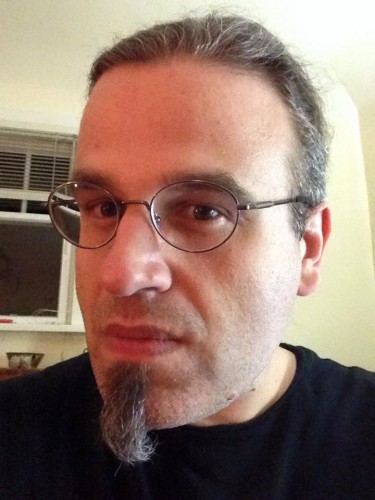While the modern Pagan movement is still considered young in comparison to other religions, it has continued to grow and evolve beyond its original container. Today we see multiple generations of Pagan practitioners in various facets of community, from seekers to leaders. The vast diversity within this community has expanded beyond the old images of the middle-aged leader to those on all sides of the age, race and gender spectrum.
Ten to fifteen years ago we did not have as many “younger” leaders rising within the ranks of our Pagan community, yet today the halls of any Pagan convention show younger and more diverse populations than we historically are use to encountering.
![[Photo Credit: pixababy.com]](https://wildhunt.org/wp-content/uploads/2015/03/hands-together-pixababy-500x430.jpg)
[Photo Credit: pixababy.com]
The Pagan community continues to struggle with the concept of leadership, and there continues to be a lot of challenges on every side of this spectrum. Over the last few months, discussions about ageism have risen to the surface again, with some intense dialog pushing the conversation to the forefront.
In a recent piece on leadership, Annika Mongan explored some of her experiences at this year’s PantheaCon conference. In it she discusses some of the challenges of new leaders within the modern Pagan community and the idea that those who are new to leadership have a lot to offer. She wrote, “I respect our elders and seek to learn from them. I am grateful for all the battles they fought, the roads they paved for us, and the foundations they laid. And I now understand that it is time for me and for us, the younger generations, to step up, to walk upon these paved roads, and to build upon these foundations.”
This is not the first time that we have heard of the specific challenges encountered by young leaders when becoming more active in the greater Pagan community. It is also not the first time that there was a strong reaction to the idea that young leaders may not be embraced by community elders. The growing divide between the generations has become more apparent in recent years.
PantheaCon’s Turning the Wheel panel attempted to address some of these very challenges. Jason Thomas Pitzl, Board Member for Solar Cross and one of the organizers for the project, has been very vocal about the need to sustain effective leadership in the modern Pagan movement. He said, “Turning the Wheel is a new initiative from the Solar Cross Temple that has a very simple aim: encourage young and emerging leadership within the interconnected Pagan and Polytheist communities.The panel conducted at PantheaCon 2015 was just a first step, the next step will be to help create spaces for emerging leaders to network, build alliances, and establish new initiatives. This is so important because without these voices, without building real relationships with these leaders, we literally lose contact with our future. I have already seen our “generation gap” become a “generation chasm” in the last decade, and if we are to maintain the good works earlier generations have started in the coming decades, this must be addressed.”
As we continue to identify the challenges of growth, the generation gaps and the shifting power balance that comes with an aging community, we have the chance to explore what can be done to support the journey. How can we face the challenges of these transitions in ways that are healthy and validating to the multiple levels of leadership, all of which need to co-exist in our community? We know that these questions are layered, complex and intersectional, yet it appears that now is the right time to start asking some of these hard questions.
What are the biggest challenges facing emerging leaders? How can the greater community support these transitions to leadership within our community?
Jessica Sullivan
I would say a major problem is the lack of support for young leaders. There are many in our community, but few are considered “big named Pagans.” Those that are, can be targeted, isolated, and considered an exception to the norm. There is little to no space made for us, the young leaders. When an opportunity does arise, when we climb our way to the table, we are frequently dismissed or unheard altogether. While it’s hard to address these problems, it is not impossible. Making more opportunities for young leaders would be a major and crucial first step. Another equally important thing is to make space in conversations and ask questions. Rather than making assumptions and further making statements, or worse unsolicited advice, at a young leader, ask more questions. Perhaps the said young leader didn’t think of something, but assuming they didn’t and automatically dismissing their ideas or offering advice immediately comes off as both condescending and dismissive. Asking more questions also has the fringe benefits of being more constructive to conversations and supporting young leaders to address possible flaws in their ideas, in a way that is both empowering and builds on their skills as new leaders. Obviously younger leaders have less experience, but by shutting them out and shutting them down, how are they supposed to get the experience to be “respectable” leaders?
The pressure to be perfect, does not allow for mistakes.Young leaders that are selected to join elders in deliberations are in a high-pressure position to represent all young leaders. If they make a mistake, then it is reflected on young leaders everywhere.Youth make mistakes… but that does not mean that they are failures as leaders and should therefore be ignored. Mistakes are opportunities for growth, especially in leadership skills. Even the best of leaders make mistakes, but established leaders have the background and social support, that young leaders lack, to allow them to maintain their prestige and presence in the community. Young leaders do not have those resources. Young leaders need extra support and understanding from their fellow, and older, leaders. – Jessica Sullivan
Annika Mongan
I think one of the greatest challenges for emerging leaders is this fascinating and difficult time we find ourselves in. Elders and founders of traditions are aging and dying and the cohesiveness of Pagan ‘umbrella’ has come into question. We still have elders among us who pioneered the way and whose work laid the foundations upon which we stand. At the same time we have important conversations about our identity led by younger generations, including around our relationship to racism, cultural appropriation, and social justice. The face of our Paganisms is changing and it is challenging to know when to look to tradition and the work of our elders, and when to recognize the need to build on their foundations differently then they may have imagined. – Annika Mongan
Jason Thomas Pitzl
It is truly hard for me to narrow this down to a single challenge, but I would have to say that one huge obstacle we collectively face is the fact that the old networks used to establish the infrastructure, events, and relationships within what we call the “Pagan Community” are largely disconnected with what folks under 30, and maybe even under 40, are doing. I’m not trying to say this in an accusatory way, I’m simply relating what I’ve seen in my experience. Now, this isn’t true everywhere, there are regional pockets that have managed to maintain healthy multi-generational models that are working, but I’ve also seen many instances of disfunction, break-down, and clinging to decades-old turf battles that have seemingly salted the earth in terms of building healthy communities. This widening “generation chasm” means that our value systems, and our ways of operating, even our vocabularies, are drifting apart. You have only to look at the responses to #blacklivesmatter, or the emergence of the Polytheist movement, or the renewed interest in radical thought and action from within a Pagan, Polytheist, or Witchcraft context, to experience these experiential gulfs.
As an illustrative aside – I have seen the mere mention of empowering younger leaders met with instantly defensive comments about “respecting elders” as though respect were a finite resource to be hoarded instead of an ethos to be spread far and wide, but I digress.
How can our interconnected communities support smoother transitions? By being brave, by listening and learning, by not sequestering one’s self entirely in pockets of comfort. – Jason Thomas Pitzl
Courtney Weber
We need more “how-to’s” and “This worked for me when’s….” I could find plenty of information written for a Christian pastor on how to support a person with severe depressed or suicidal person in their community, but it’s hard to find that information in my spiritual context. We need more leaders sharing their specific experiences in conflict, crisis, or otherwise. We particularly it from leaders or other members of the community with professional counseling, conflict mediation, or other backgrounds that deal with the tough and painful. We simply need more information to do the work, but we need it through a lens identified in Pagan spirituality. If you’ve been through it, talk about it. Have a place where people can reach you (website or social media). Answer emails. Make yourself available to people who have questions. – Courtney Weber
Jasper James
The biggest challenge facing emerging leaders right now is the disunity and animosity that is growing between certain sects due to racial tension within the modern Pagan community. I witnessed both blatant confrontations and a complete dismissal of race based issues hidden behind the “we are all one” rhetoric at Pcon this past winter. The truth is, I feel there is a lack of empathy for the very real struggles facing PoC brothers and sisters today within the Pagan community that leads to a lack of action. In my opinion, the greater community can support smoother transitions to leadership and action by officially adopting LOVE as its ultimate mission. The vibration, 528Hz is known simply as the “Love Hertz.” It has been used by molecular biologists to repair genetic defects, and early historical records indicate that it was used as an inseparable part of ritual ceremony. By approaching spiritual practice with the vibration of Love, you fundamentally attune yourself to the interconnectedness of all of creation. Therefore, If your spiritual practice has the true element of Love at the core then it is impossible for you not to take responsibility for that which occurs around you. – Jasper James
Sophia Sheree Martinez
My journey as a leader started with my initial need to be part of a community. I have been part of a few communities that have since dissolved, taken different shapes, or just plain didn’t fit. My first coven experience (Circle of the Gathering Winds, Chico, CA) required me to be capable of writing and conducting my own rituals. That experience becomes my first taste in any Pagan leadership. From then I knew I was meant to do more for my Heathen community. I eventually moved to the Bay Area, where I helped create Golden Gate Kindred and its charter completely from scratch (a kindred comprised of free and equal peers). Strong differences of opinions unanimously dissuaded all voting members of our kindred from affiliating with any existing Heathen organizations, causing many people within our wider community to question our judgments.
Most of our members being under 40 years old … it takes a lot of knowledge and wisdom to feel confident when debating with well established Heathen elders about the changes you’d like to see. Reputation and honor are very important in Heathen practice, and people tend to be unconditionally loyal (often to a fault). It was hard to get our kindred recognized for a while because of tightly knit communities, but we have been gaining a voice and growing presence quickly over the past year.
To those who have been open to change, who have welcomed and mentored us, that is exactly what we need to feel accepted and of equal importance. I often organize events such as Blots, Sumbels, moots, and study groups for our kindred. While we do not have elected leaders, our members have all made niches for themselves, and I just happen to be the one facilitating events currently with help and inspiration from other members. It takes time, commitment, patience, and consistency to keep a community together. I believe a good leader is someone that lends their skill to empower the community, keeping faith that the community will keep giving back in countless ways. – Sophia Sheree Martinez
Lisa Bland
“One of the biggest challenges that emerging leaders within the modern Pagan community is that there is a real lack of education and mentorship. Mentorship is one aspect that current leaders can offer to younger members of the community who are stepping forward in their own leadership abilities. Our communities need to find ways to develop our own leadership programs or workshops, and mentorship programs – these two things together have been shown throughout evidence to be cornerstones to helping develop leaders and improve leadership structures. Until our community is able to support these workshops ourselves, I would see benefit in seeking out some of these educational needs through other avenues such as workplaces, other community organizations, and young leaders seeking out those who they identify as leaders that could provide one on one mentorship. I feel that the greater community has a real struggle with changing leadership and also with a recognition that leaders and teachers may not be the same person. Paganism is so diverse and continues to grow! We will see more leaders in various areas blossom and this shift in how our communities grow together will determine how each community area will not only survive, but thrive. We may all be a part of the same garden, but not all plants grow well next to each other. For a thriving garden, understanding what each plant needs, and how they can support one another will help communities feed each of our spirits.” – Lisa Bland
Lasara Firefox Allen
I will say that I think the solution to smoother transitions in leadership is mutual respect. – in all directions. As someone in the middle of generations (daughter of a pagan mother and mother of a pagan daughter) I can say there are more than two sides to this issue.
To me, the central question is; how can we create intergenerational integrity? – Lasara Firefox Allen
The comments above provide a clear snapshot of the many different angles that people come from and the variety of ways that this topic can be approached. It is a big one, and one of the many hard conversations that the modern Pagan and Polytheist communities are engaging in right now. As we embark on the myriad transitions that are continuing to shape our culture, we have to explore this age old problem that many communities have faced time and time again. How do we honor and learn from our elders while making space for those who are currently leading or emerging as leaders? How do we make space without dishonoring the process and our past?
It is essential to look at the concept of leadership from a multifaceted perspective, one that has many faces, many different purposes, and an interconnected need. When we approach community and leadership from a perspective that is layered, intersectional, multi-dimensional, and necessary, we are able to see the variety of positions that are valuable within the growing and expanding modern Pagan movement. Polarized concepts of leadership discourage creativity, supportive transitions and honest reflection of the needs we are tasked to support.
In our discussion, Jason mentioned something very key to this process of evolving leadership, closing the age gap and creating space for emerging leaders. “That doesn’t mean ignoring elders, or removing leaders, it means make space. Ask them what they want to do, what they want to achieve, they may surprise you with the innovative methods they have towards building a vital and healthy group. Make transition happen, handoff projects, build trust. The only way we are going to see any of the worthy projects started in the last 20 years endure for the next 50, or 100, is if we do this. If we don’t, they just might build a new community without us”
The Wild Hunt is not responsible for links to external content.
To join a conversation on this post:
Visit our The Wild Hunt subreddit! Point your favorite browser to https://www.reddit.com/r/The_Wild_Hunt_News/, then click “JOIN”. Make sure to click the bell, too, to be notified of new articles posted to our subreddit.








Thank you for this interesting article. Many of the issues raised about how to develop next-generation leadership were raised at the Pagan Summit in 2001. Many regional conferences were spawned by that event that have taken on this issue. I think we have moved beyond theory and into practice, which is where things get tricky.
For my part, I offer this link: http://www.ourfreedomcoalition.org/summit/ It gives all kinds of information about the historical summit, but perhaps the most useful piece is the guide to organizing your own summit. These kinds of events that are focused on process issues exclusively are rare in the Pagan movement. We’re not going to see change simply by having the occasional panel at a festival. We need to develop safe spaces where people of differing backgrounds can come together and brainstorm respectfully how best to move forward. Working in person is very effective; I’d take a difficult face-to-face discussion with the chance of a positive outcome over a blog post any day. (I’m not dissing your post — I’m just saying that I think there’s a tendency for us to broadcast our opinions rather than engage in meaningful in-person dialogue.)
I will be sharing some of the information in this post with Our Freedom, a coalition I founded that focuses on Pagan civil rights. Many “big name Pagans” are involved, many of whom attended the summit. I think you’ve raised important issues and I would like to keep the conversation going. Spring blessings to you.
at this point, the moment I hear the phrase “big name Pagan” I really just lose interest in what’s being said. If an article or argument has to resort to such name dropping and “appeals to authority” such as this, or conversely, must use a buzzword phrase as an “ad Hominem” attack against something or someone -then it’s simply no longer a discussion I want to be a part of.
And because you stopped reading at that point and refused to actually think of the context the word was being used in, you missed out on an article and an opportunity for critical thought. Congrats, I suppose?
I read it. I wouldn’t have taken the time out of my day to write this if I hadn’t. Unfortunately, I simply lost interest in what I was reading. To me, words matter. If people are going to resort to lazy writing, buzzwords and specious, vaguely defined terms such as “big name Pagan” in an attempt to get their point across, then I ask -what have I actually missed out on? Critical thought is exactly what brought me to this position regarding potato-chip words such as “BNP”.
I’m sure jargon like this is useful to some people, but not me.
Mentorship has always been key. Those of us who have been around for a while (33 years for me) have a responsibility to work with up and coming talent, to add them to our ritual writing and performance teams and to gradually and gracefully hand off the responsibilities to them. It saddens me when I see groups with the same leaders for twenty years or longer and a string of disappointed up and comers who’ve had to split off to get any real experience as leaders. And even sadder is those former leaders who bask in the memory of their glories but are simply no longer relevant , in large part because they have not mentored well and do not have vibrant young talent working alongside them.
Our Temple has a ritual team mostly in their twenties (and the PS and I, as grizzled veterans in our 50s), and two clergy in training in their twenties who are taking on more leadership tasks, a university outreach and active engagement around various larger political and social issues (LGBTQ and support for sex-trade workers, plus a microloan project)
I would not be surprised if TWH were interested in your Temple’s social justice programs as examples of Pagan ethics in action.
This really just sounds like more examples of the impatience of youth. It’s not unique to Paganism at all; young people always think they know more than their elders no matter what the venue, and are impatient to take over and make all the changes that they think are “obviously” needed, not realizing some obvious pitfall or historical precedent for trying it in the past that didn’t work out. They then feel slighted when their energetic advice isn’t taken.
The way young people become leaders is by being followers. Follow well enough, long enough, and you’ll become older, wiser, and… a leader. Then you get to deal with the next generation of young people who are sure they can do a better job than you can. 😉
I think that depends on what you mean by “followers”. Some established organizations (I’m talking organizations in general, not necessarily Pagan groups) have systems by which new members are immediately given small tasks, then given some instruction and invited to do more complicated jobs under close supervision. If they carry those jobs out well, they are offered the chance to take on more responsibilities with guidelines and mentoring but less supervision. Around that time, they get to do some mentoring and supervising themselves. Eventually they are equipped either to be the head or strike out on their own.
Keeping people from getting to do things for no real reason will certainly cause anyone who is skilled and energetic to bail out and go where they have more room to exercise their talents. OTOH, throwing people in the deep end without a clear idea of what the job entails doesn’t do the recipient or the organization any good. Nor does handing large responsibilities to people who haven’t acquired necessary skills or demonstrated that they are trustworthy. Those things happen a lot if the group is short handed or does not have a well defined organizational structure.
Who should we follow? How old do we have to be before we can take leadership roles? What leadership roles can we take when we are ‘older’ aka ‘old enough’? What is ‘well enough’ when it comes to following? Because, from what you’ve written, it doesn’t sound like that involves action but passive acceptance of whatever the ‘elders’ are doing.
Best way to keep young people away from a group or movement? Refuse to let them do anything.
This article was interesting to me for numerous reasons. First and foremost, I’m a lot closer to my middling years than I was when I first set out on my religious and spiritual journeying in the early 1990’s. Although I am not at all interested in the concept of leading anyone, or being led by anyone, I find being relevant is still important, as is being able to relate to other Pagans regardless of age or experience. I think ego – as it was ‘way back when’ (and that is the ‘way back when’ according to the people who initially taught me about Paganism, rather than just the ‘way back when’ of when I first started learning) – is still an issue for many of our leaders and followers as well. Where is the humility in leadership, regardless of age, when it uses something like age as a knee-jerk justification for its failings? “Rank follows the man,” is a phrase I learned when I was growing up: leaders should be called as such because that is what they are doing, rather than being called as such because they feel being in charge is what they are entitled to. A leader in any community is only as strong as the people standing behind him or her, again regardless of age or other demographic. If a 22 year-old is able to demonstrate clear leadership and the ability to move her or his community forward, where a 52 year-old sits around and huffs and puffs about the glory days and the lack of respect demonstrated by newer followers, I’d say the situation speaks for itself. At the same time, when said 52 year-old has managed to move a community forward, and is continuing to do so, it’s no wonder when a relative neophyte (regardless how inspired or connected to the gods and spirits) finds it difficult to be heard above the voice of established leadership. What would be ideal would be for the leaders in both scenarios to take the time to listen to followers, both experienced and inexperienced, to look for new sources of inspiration and vision and dwell more in the middle of the two poles, rather than standing solidly on one side or the other … balance is a central tenet in many of our beliefs, after all, a good leader would then naturally demonstrate this in his or her approach.
Also, to point out something Jessica Sullivan was quoted as having said in the above article, pertaining to ‘youth making mistakes.’ We all make mistakes. As a point of advice to newer generations of leaders within the Pagan community: understand that we all have made, and will make mistakes. As a young leader – as a young person in general – coming into the world, please learn as much from the mistakes that have been made as you do from the successes that have been achieved. Apply this to your own mistakes, as well, and develop the humility to allow others to learn from your mistakes; and you may find yourselves being highly effective leaders.
Sorry for the comment being so long-winded – I hope it will help someone, just the same.
I think of a Pagan festival that I have attended off and on since the 1980s. It used to offer some great experiences, but lately it has gotten to be a bit too sedate. The same people are in charge of it now that were in charge of it then, and perhaps that is part of the problem.
On the other hand, who put them in charge? They themselves did. The Pagan movement as a whole is not a corporation with a board of directors. It is always extraordinarily fissile.
Why feel hurt because “they” are not inviting you to the table? Set up your own table! That’s how it happens. If you try to join an existing organization, like the festival that I mentioned, you might have to labor in obscurity for a time before your wonderfulness is recognized. If you don’t have the patience for that, then start your own.
This essay, “Religion for Commoners” seems appropriate here.
I agree with Chas’s “That’s how it happens” remark.
I was in my mid twenties when I first made contact with our local pagan community. It was large for the time and active, with several organizations putting on semi-public events. There were multiple leaders who got along pretty well. Most of them were in their late twenties to early forties and had five to ten years of study and experience under their belts.
I was immediately made welcome and introduced around. I was also treated as a solitary newcomer and not given any more respect than other solitary newcomers, which was fair. After a couple of years showing up where I was invited, I figured out what I wanted to do, and that none of the existing groups was going to provide it. So I rounded up some collaborators and started a study group.
After it became clear that this group was solid and not a flash in the pan, there was a marked change in how people treated me. Being a leader of a small group gave me a standing that I hadn’t had before. Teachers and leaders with a good deal more experience and knowledge than mine started treating me as a peer, even though I wasn’t expecting that.
Maybe it’s different other places and times. Our community was more collegial and less competitive than some. Still, I think Scoop Nisker’s advice, “If you don’t like the news, go out and make some of your own,” applies here.
Thank you for this piece, Crystal. It is very relevant to my life right now on the cusp of turning 60. Mentoring and encouraging younger people has always been a joy of mine. Yet, I also experience the fear of being discarded for the latest and shiniest thing. Much of this fear comes from an over culture that dismisses older women. As we look to make room for emerging leaders, I hope we stop to notice whether we are being influenced by that culture. At 60, I am at the peak of my knowledge and wisdom. I can only expect that to increase, at least for a few more years! I was actually young once myself and realize it can be hard to “honor our elders.” My generation did a terrible job at that. I see younger folk now doing a better one. May we all continue to learn this dance.
It’s interesting to me that, while many of the comments spoke of things like the lack of mentoring from Pagan elders toward younger leaders, there were no comments from either elders providing such support or from young leaders receiving it. I can assure you that such relationships exist–I’ve watched new leadership blossom in my local Pagan community, within the EarthSpirit Community, for instance.
As an elder with a strong desire to mentor and support emerging
leaders, I am often frustrated at how difficult it can be to offer my
support in exactly this way: I doubt very much I am alone in finding it
satisfying to encourage new voices. Sadly–and perhaps with
reason–offers of support and mentoring are often met with disinterest
or even an assumption that the elder reaching out is doing so for some
hidden purpose of their own. I know there are established leaders out
there who do belittle newcomers… but I also know there are success
stories: locally, I get to see them. I wish I could have read about others here.
Time, education, and respect are what make a leader of a particular group. I have no idea who the well-thought people are in Wicca, CR, Asatru, Religio Romana, etc. because I am not a member of any of those groups. I am aware of the people in my community of Hellenic Recons, both solitary and in groups. People who walk the walk and do not just talk out the side of their mouths, these are the people I respect. Personally, I do not think that a very young person has the “chops” yet to be even considered a “leader.” Why can I say this? Have you EVER put your LIFE on the line for something bigger than yourself? I am a USAF veteran with one year in South Korea, which is still AT WAR with North Korea. We almost did re-start it in 1976. Have you really educated yourself? The US educational system is pitiful. The amount of ignorance is horrendous and in generic paganism ….(I can’t speak the words). Can you speak at least one language other than your birth language? Yes, I do freely admit to being an intellectual. However, that is so much better than being a fool being taken for a ride from these so-called BNPs. Only then can you even hope to come up to snuff.